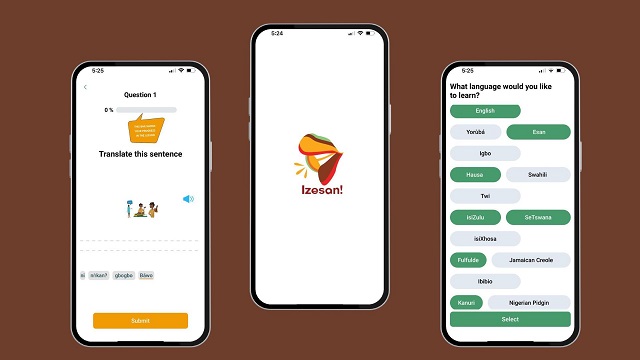
It enables users to seamlessly switch between Afrikaans, Amharic, ChiShona, isiXhosa, isiZulu, Kinyarwanda, kiSwahili, Portuguese, French, English
FEATURE | PHENDU KUTA | Vambo AI, a multilingual generative AI developed by South African tech startup Vambo Technologies, is a pioneering language accessibility platform. It aims to empower users to seamlessly communicate, learn, and create content in various African languages, fostering cultural inclusivity and breaking linguistic barriers.
Vambo AI works by understanding multiple languages, including uncommon pairs, and being generative for content creation. Its goal is to empower Africans to engage in their languages, fostering a connection with the continent’s diverse linguistic landscape. For example, a user can type in a question in Zulu and have it translated into Amharic.
When Vando AI cofounder Chido Dzinotyiwei moved to South Africa from Zimbabwe as a child, language became both an obstacle and an opportunity for change. Her primary concern as an adult was children struggling with their mother tongue in new environments, facing challenges in pronouncing names, and finding it difficult to connect with the languages spoken in their surroundings.
Fast forward to today, the entrepreneur and Mandela-Rhodes Scholar, now based in Johannesburg, is on a mission with her business, Vambo Academy and project, Vambo AI, to address the vital language needs of African communities.
“Having moved to another country in my early schooling years, I had to learn a language in order to succeed at school and I had to learn other languages in order to make friends. I ended up having to repeat grade 4 because the only language I was fluent in at the time was my mother tongue [ChiShona] which was neither the local language nor the language of instruction”, she shared, detailing her own struggles with language barriers.
Vambo Academy, created in 2019, was initially a private language tutoring service conducted in people’s homes. It became a thriving endeavour until the pandemic abruptly halted the business. Faced with this challenge, Dzinotyiwei made a crucial decision for the continuity of the business by exploring the integration of technology into language education.
The same year Vambo Academy was created, Dzinotyiwei met her now co-founder, Isheanesu Misi, when he participated in a business pitch competition which she was hosting, called YouthSolve, aimed at solving unemployment. Although they initially lost touch, they reconnected three years later through social media, where Misi engaged with Dzinotyiwei’s content on language learning and technology.
Their shared ambition to build language tech led them to join forces and create Vambo AI. Derived from the ChiShona language, Vambo means ‘Origin’ or ‘Beginning.
“Language is part of our origin story as Africans, which is why we decided to build the “Origin” Academy and now “Origin” AI,” Dzinotyiwei said.
The shift towards technology was a natural progression for Vambo Academy, which promotes African languages through technical solutions. In 2023, Vambo AI emerged as an organic discovery for the co-founders while they were engaged in the development of a new app and feature, utilising the data from Vambo Academy.
“It was important to create Vambo Academy to curate a space where people – young and old – could reconnect with their roots through language, culture and heritage,” Dzinotyiwei expressed.
She then added, “the AI component allows us to do this in a different paradigm and reach more people through the use of technology that will ensure that Africa remains abreast with modern technology.”
With a strategic approach, the co-founders handpicked languages close to their hearts, starting with their mother tongue and broadening the spectrum based on valuable user feedback. Users can explore ten dynamic languages including Afrikaans, Amharic, ChiShona, English, French, isiXhosa, isiZulu, Kinyarwanda, kiSwahili, and Portuguese facilitated through www.app.vambo.ai.
Beyond language exploration, the nature of their work necessitates collaboration with a diverse array of individuals, including native speakers, academics, translators, creatives, and more. This has not only broadened their horizons but also forged impactful collaborations, particularly with schools seeking knowledge and language support.
However, the duo faced their fair share of challenges during the strategic planning and platform development phase.
“First, we found that there are limited resources available in Africa for building AI solutions. This includes data, infrastructure, and funding opportunities. We also realised that AI was more of an abstract concept to some of the people we were looking to serve. As a result, we had to rethink our approach and cater to our target market, enabling them to access the innovative and leading aspects of our solution,” Dzinotyiwei elaborated.
“Second, we had to apply our minds and think about how best to build the experience for our target users. One key lightbulb moment we had was when we realised that people are far better at recognising languages within neighbouring communities or similar language groups than languages that were further removed,” she added.
For instance, a person whose native language is IsiXhosa is better at deciphering and understanding IsiZulu or Sesotho than they would be at doing the same for languages in other regions. To address this, Dzinotyiwei and Misi made it easier for the Vambo system to recognise languages through a free language detection software called Lingoscan by Vambo AI.
“Our model and any other models using that API can easily determine language and better cater to their users,” Dzinotyiwei said.
The co-founders discovered that establishing a company in language tech demands meticulous attention to detail and a steadfast commitment to building supporting infrastructure, particularly when aiming for accuracy and excellence.
Through feedback, users of Vambo AI, which is currently available for free, actively contribute to platform improvement.
“With our initial release, users would share examples that didn’t meet their expectations, and we would actively improve it. Now, users are not only using the platform for its initial purpose, but they are also creating and sharing new use cases within tourism, finance, immigration, enhancing what they are building.”
Dzinotyiwei shared an example of one user, Harvey Binamu, Director at Belenga Dev, a data researcher who utilised Vambo AI’s technology to integrate the plug-in to an SMS API allowing it to be used via text messages in the native language, unlocking another level of accessibility for the platform.
Vambo AI is in its beta phase, or product trial by users, at the moment and undergoing improvements.
However, to keep up with cutting-edge research in the field and actively address existing gaps, Dzinotyiwei and Misi consistently network with other stakeholders, forming a community to collaboratively solve common problems. Among them is their Responsible AI Advisor, Jonas Kgomo, who provides support and guidance, ensuring the development of AI that is safe for users and platforms while upholding the integrity of the languages offered by their business.
As the landscape of AI in Africa continues to evolve, it becomes imperative to examine the potential and challenges facing the industry. Taking this into account, Jonas Kgomo, the Responsible AI Advisor for Vambo AI, shared his perspective.
“Africa is home to a wealth of talent and innovation, and I believe that AI can be a powerful tool for solving some of the continent’s most pressing challenges. There remain global deliberation and democratic challenges ahead. I see opportunities for AI to improve healthcare, education, agriculture, and financial inclusion. However, there are also challenges that need addressing, such as the lack of access to data, data sovereignty, and the need for oversight across AI applications.”
“Vambo AI’s focus on linguistic diversity and cultural inclusivity is essential for creating AI solutions that are relevant and useful to people across the continent. I’m excited to see what Vambo AI accomplishes in the years to come, especially in unearthing qualities of indigenous knowledge and reconciling the techno-linguistic gap,” Kgomo added.
Dzinotyiwei and Misi might be innovative in their own right, however, they are part of a cohort of African youth who are looking to AI to change the language landscape on the continent.
One example is that of Ghanaian Danny Manu, a serial entrepreneur, designer and manufacturer of live translation earbuds that help individuals and companies break language barriers with their inventions.
Manu’s earbuds are available for purchase on Amazon and offer translation for 37+ languages.
Looking ahead, Vambo AI aims to expand its features, making the platform multimodal with voice capabilities, Internet search, and additional languages. The journey of language tech, as outlined by the co-founders, is a testament to the potential of African-led AI solutions.
*****
Source: Bird story agency
 The Independent Uganda: You get the Truth we Pay the Price
The Independent Uganda: You get the Truth we Pay the Price



